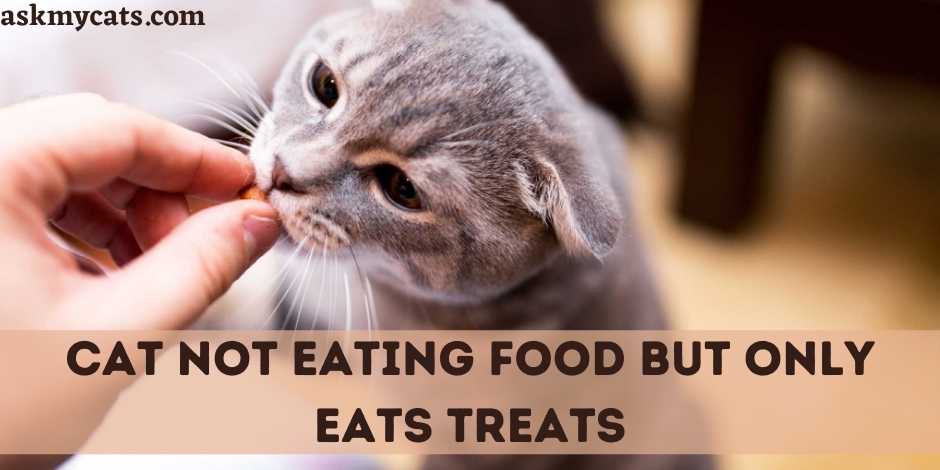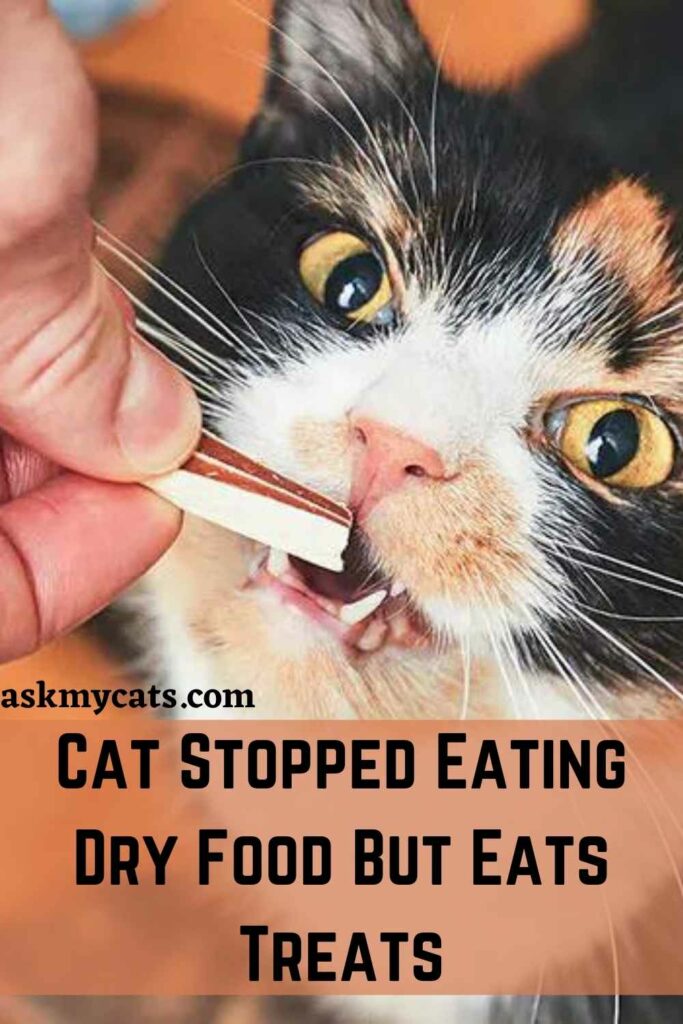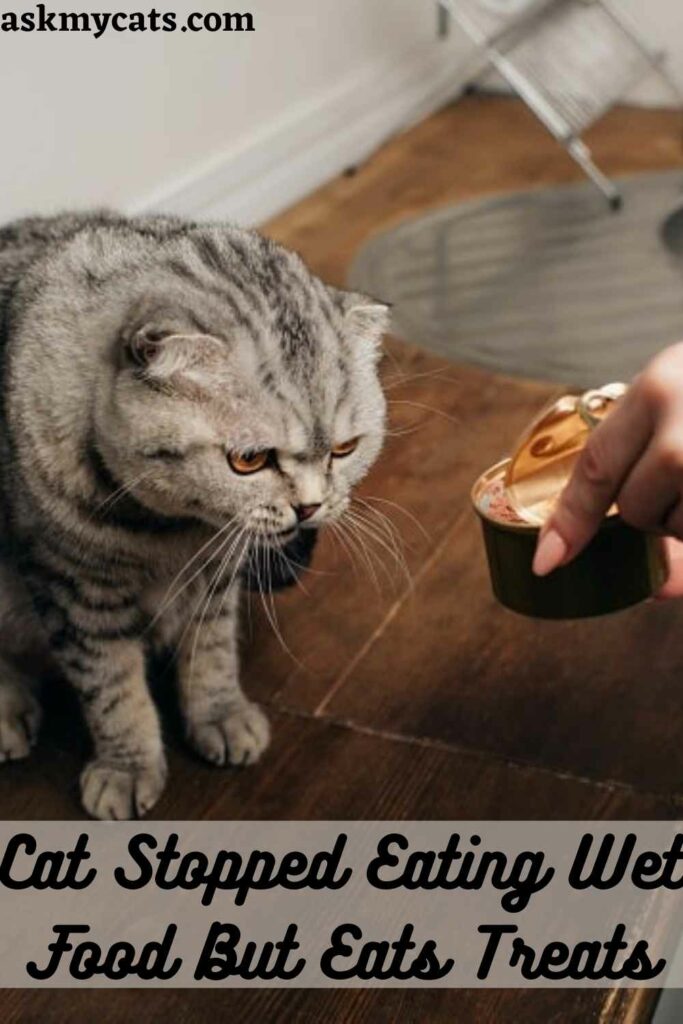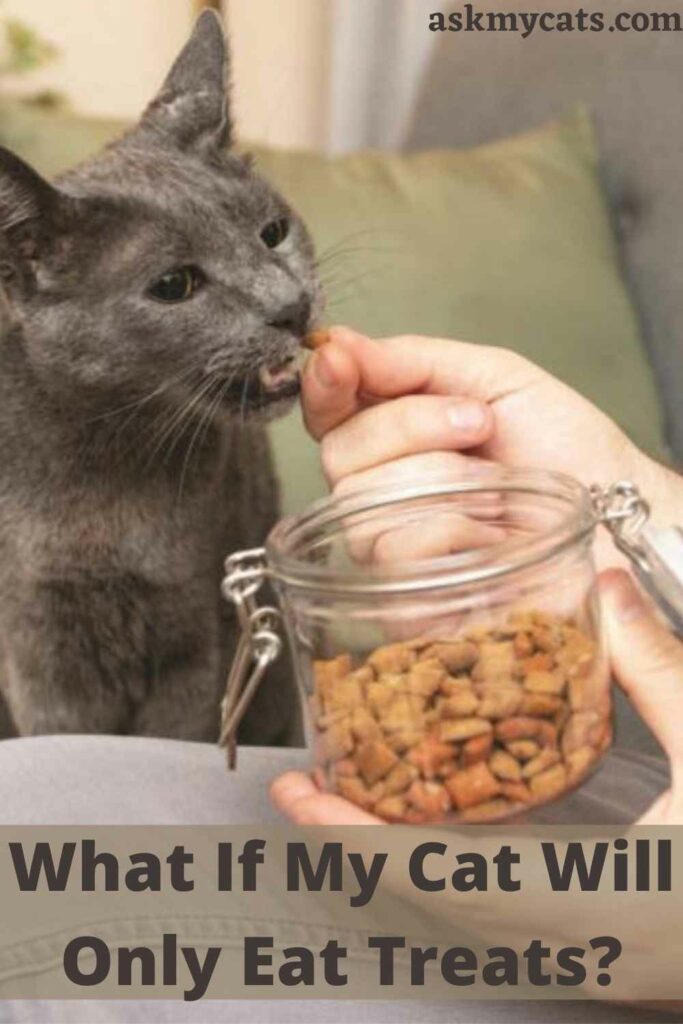The majority of cat owners are unconcerned with their cats’ dietary habits. If you put food in their bowl, they will consume it immediately. Some cats, on the other hand, are only interested in certain sorts of food, such as treats.
When cats refuse to eat or only eat treats, it may be a nightmare for cat owners. Treating your cat with more than 10 to 15 calories per day is not recommended by veterinarians or pet specialists.
So, why is your cat not eating food but only treats?
The most common reason behind your cat not eating food but only treats is because something in their environment has changed.
This article will talk about all the reasons why your cat refuses to eat food and only eat treats and how can you fix it.

Cat Stopped Eating Dry Food But Eats Treats
Reasons responsible for cats not eating dry food but eating treats are: –

1. Change In Environment
As previously stated, changes in your cat’s environment may be all that is required to turn your cat into a picky eater.
This is especially true for domestic cats, who have grown accustomed to life’s finer pleasures and are not well adapted to change.
Begin by taking a look around and noting any changes. Has a new pet or person been introduced into the home?
Have you progressed from watching your cat eat to allowing them to eat on their own?
Have you reduced the frequency with which you clean their bowl? Any minor alteration can cause your cat to stop eating dry food.
Revert to old habits where possible, such as if you have stopped washing their food bowl as frequently, and see if this improves your cat’s feeding.
You may not have realized you’ve been letting things like this slide, and by resuming your normal routine, your cat will happily eat once more.
If the change is irreversible, such as when you get a new pet, try to establish a new and consistent routine to help your cat regain its comfort and resume normal eating.
It may take some time for your cat to adjust, but once they realize these changes aren’t a threat to them, they should regain their appetite.
2. Treat Overdose
Another common reason your cat only wants to eat treats and refuses to eat dry food is that you have been overly generous with the treats you have given them in the first place.
Because your cat doesn’t eat much, you entice them with treats, causing them to eat less of their food. As a result, the cycle continues.
Cats, on the other hand, are cunning creatures, and they will quickly realize that if they do not eat their dinner, they will receive a tasty reward.
This can lead to a picky attitude toward food over time, as well as an increased risk of several health conditions, such as obesity.
Furthermore, treats are low in nutrients when compared to kibble and will not provide a complete diet if consumed alone.
If this describes your situation, instead of rewarding your cat for refusing to eat their dry food, you should reinforce good behavior. Stop giving your cats treats and only feed them at regular intervals throughout the day.
Initially, your cat may refuse to eat. However, hunger should take over after a few days, and you should notice an improvement in your cat’s appetite for dry food.
They’ll have realized that their dry food is all they’re going to get, so it’s better to eat it than go hungry.
You might also like to know about can i add water to dry cat food
3. Dehydration
It’s also possible that your cat has stopped eating dry food but is still eating treats because he’s dehydrated. This is especially likely if they eat wet food without complaint but are extremely picky when it comes to dry food.
Dry food is, well… dry! This means that if your cat is thirsty, eating dry food can be difficult and result in a significant thirst. While they can’t say no to a treat, a whole bowl of dry cat food is likely to turn them off.
Make sure there is always fresh water available for your cat to drink, and that the water in their bowl is replenished at least once per day. If your cat is picky about drinking, a cat water fountain may encourage them to drink more; cats prefer flowing water to standing water.
You could try mixing some water with their dry food to see if it encourages them to eat more of it.
This will help them consume more liquid while also making them fuller and is a great hack for reducing the appetite of overweight cats who have eaten too many treats! You could also combine some of their dry food with some of their wet food.
Dehydration may also be the reason your cat stops eating kibble during the hot summer months. Cats are more likely to become dehydrated when the temperature outside rises.
Furthermore, hot weather may reduce your cat’s appetite for a heavy meal, much like how we might prefer a light salad over a heavy roast dinner on a hot summer day.
Also, check out reasons behind cat suddenly walking like drunk
Cat Stopped Eating Wet Food But Eats Treats
Reasons responsible for cats not eating wet food but eating treats are: –

1. No Established Routine
Your cat may have stopped eating wet food since there is no fixed feeding regimen.
For them, this is inconvenient, and they rely on a fixed pattern to eat happily.
In fact, sticking to a feeding schedule is a wonderful method to avoid fussy eaters.
If you frequently leave wet food out for your cat to graze on during the day, the first thing you should do is cease doing so.
Instead, keep to a feeding schedule and serve meals at specific intervals throughout the day.
Clear the bowl and toss anything that is left in the garbage after leaving your cat’s food out for around 30 minutes.
This will assist your cat in recognizing when they are allowed to eat and will encourage them to become less choosy.
At a bare minimum, your feeding schedule should include at least two meals per day, separated by 12 hours.
Some owners, on the other hand, prefer to divide food into five or six smaller meals, which can assist to slow down eating and relieve indigestion.
Make sure that any eating schedule you design fits into your schedule so that you can commit to it and stay to it. Breaking the schedule will simply cause more disruption, and you’ll have to start all over again.
Also, know the possible reasons behind cat asking for food but not eating
2. Spoiled Wet Food
It’s also conceivable that your cat’s wet food has gone stale and has passed its expiration date.
Check the date on the box, and if it’s past its best before date, toss the rest of the food out and buy more. Do you no longer have the packet? Take a whiff to see if it smells like it’s gone off.
Consider whether the food will spoil if the expiration date is still a long way off. This is frequent throughout the summer months because wet food absorbs more moisture from the air in hot weather, which causes the food to become stale.
Replenish your supplies and see if this restores your cat’s appetite. Keep cat food in its original packaging and store the bag in a sealed container to avoid spoilage in the future.
Keep this container in a cold, dry place to ensure long-term freshness.
It’s also possible that the manufacturer made minor changes to the recipe. This could explain why your cat refuses to consume wet food, even though you’ve been feeding it to them for years.
Because cats are finicky, even tiny adjustments to a recipe can cause subtle flavor changes that they don’t like.
Must Read: How Long Can A Cat Go Without Eating?
What If My Cat Will Only Eat Treats?
If your cat will only eat treats then it would have drastic effects on its health.

Excessive treats lead to weight gain and don’t give a well-balanced diet to your cat.
To stay healthy, your cat needs to eat nutritionally balanced food in the right proportions every day.
So, in this situation, it’s time for some adjustments.
Stop giving your cat extra foods and special treats and stick to a normal feeding plan.
Because cats are grazers, put out a modest amount of food several times a day if possible.
Wait after you’ve put down the right amount of food at a consistent time each day.
If your cat refuses to eat the food you’ve offered, try again later.
Wait a day if he won’t eat, and as long as he’s in good health and isn’t an obese (or diabetic) animal, and maybe hunger will take control.
This will assist to increase his appetite for cat food, and he should learn that this is the sole food he will be getting every day after a short time.
Can I Feed My Cat Only Cat Treats?
No, you must not feed your cat only treats as this will make them obese and deteriorate their health over time.
Experts say that when it comes to offering treats to cats, moderation is crucial. Treats are fine to give your cat, but they “should be a very minor part of the diet,” according to Marla J. McGeorge, DVM, an Oregon veterinarian who specializes in felines.
How small? Cat treats should make up no more than 10% of a cat’s overall calorie intake, according to many experts. That’s because, according to McGeorge, most treats only add calories to a cat’s diet.
A high-quality, nutritionally complete cat food should provide the remaining 90% of your cat’s calories.
Can Too Many Cat Treat Hurt A Cat?
Yes, too many treats can hurt a cat as they can gain weight significantly and can become fussy eaters.
Your cat’s appetite for her regular diet will be harmed if she eats too many treats.
This can lead to a long-term nutritional imbalance and transform her into a “picky eater,” making it more difficult to employ special diets later in life if the need arises to manage a condition nutritionally.
Finally, too many treats contribute to cats being overweight and obese, two illnesses that are currently afflicting family cats in epidemic proportions.
While physical activity is crucial in sustaining good health, nutritional science tells us that ‘calories in’ is by far the most important factor.
Treats labeled ‘light’ or ‘reduced calorie’ should not be trusted. These treats are not considerably lower in calories than other treats, and they do add to a cat’s daily calorie consumption.
Frequently Asked Question
How to choose cat treats?
It’s critical to know what’s in your cat’s treats. Pay attention to the ingredients while buying for cat snacks. Look for natural, high-quality components. Treats with a protein source listed first, such as salmon or chicken, are an excellent place to start. Fats and proteins provide the nutrition that cats require. It’s critical for cats to have treats prepared specifically for them because they’re true carnivores.
How to make a cat eat?
If nothing else seems to be working and your cat isn’t eating, you might want to try switching their diet. Continue to feed them their preferred wet or dry food and gradually introduce them to the new formula over the course of 7-10 days by gradually increasing the amount of new food in each meal. Sudden dietary changes might cause diarrhea and vomiting. Sometimes all it takes is a small modification in the recipe to appeal to their taste buds.
How to give medicine to a fussy cat?
It’s difficult to give medicine to any cat, but it’s considerably more difficult with a picky eater. Whether you fear you’ll have trouble medicating your pet with tablets, ask your veterinarian if there are any other options. You can also request that they demonstrate how to properly and safely give medicines. Avoid hiding tablets or medicine in the food of a fussy cat, since this will make them much more averse to eating.
Final Words
No matter how much you like watching your cat consume their treats, you must keep the amount under control.
Excessive consumption of treats can result in major health problems. If your cat isn’t eating her food, try some of the methods described above. If nothing else seems to be working, take her to the vet for a checkup.
If you have any unanswered questions, feel free to ask us in the comments section.

Cat only ate treats for six years. Was not over weight and ran a lot. Sudden death at six years. Suspect it was a heart attack. Your opinion !
As for the correlation between only eating treats and sudden death, it’s hard to say for sure without more information. It’s certainly possible that a diet high in treats could have played a role in the cat’s health issues and ultimately, their passing. However, it’s also important to note that cats can be prone to certain health issues such as heart disease, regardless of their diet.
In my opinion, it’s always best to consult with a veterinarian and have a thorough examination done to try and gain a better understanding of what may have led to the cat’s passing. It may not provide all the answers, but it can help provide some closure and understanding. And of course, it’s always important to keep a close eye on our furry friends’ health and make sure they’re receiving a balanced and healthy diet.